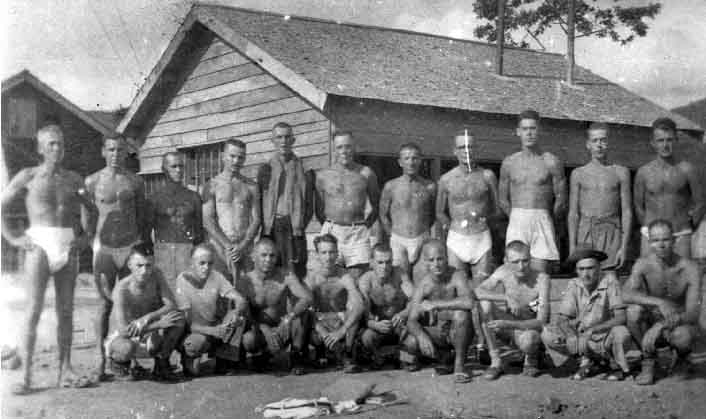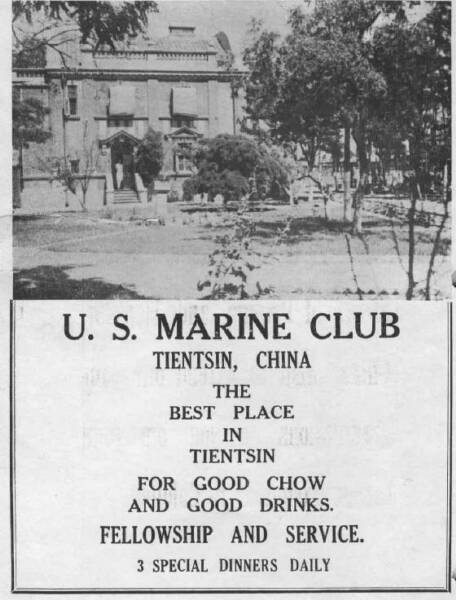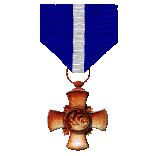Front row l to r:Gessner, Jarret, Carlson, Timpany, Hardway, Kelly, Beeman, Benson, Carpenter
Back row l to r:Davis, MacDonald, Leon, Darr, Becker, Schneider, Schick, Callis, Bennett, C Parr, G Parr
Photo was taken after POWs had moved outside to sleep so as to escape the
fleas. This explains gear on ground in front of POWs.
Of the 203 captured 5 were Food Service. Mr Darr is only one of 23 still living, and the only one from Food Service.
They were captured in North China by the Japs, the same day Pearl Harbor was hit, and remained POW's though out the entire war. Mr Darr retired as a WO
9-15-2006 MCRD San Diego, CA. - Seven of the original 203 U.S. Marines stationed
in North China who were captured by the Japanese the day Pearl Harbor was
bombed graced the depot with their presence as part of their annual reunion
on Sept. 8.
On Dec. 7, 1941, just two days before the Marines were scheduled to
leave China, they awoke to see Japanese surrounding them with weapons in
hand. After being forced to give up their rifles, the Marines officially
became prisoners of war.
From that day in 1941 through Sept. 15, 1945, the North China Marines
were subject to slave labor and humiliation.
"We were forced to work in coal mines and Japanese-owned factories
doing iron work, cleaning bullet shells and even building a replica of Mount
Fuji," said Charles Darr, retired chief warrant officer.
"After spending more than three years and seven months as a POW in
four different camps, the experience still affects me to this day,"
continued Darr.
For the first two weeks of World War II, the North China Marines
remained at their barracks before being transferred to Japanese-run POW
camps in China by freight train. After less than four weeks in a camp in
Beijing, some of them were separated and sent to other camps throughout
China and some were even to sent to camps in mainland Japan.
During the four-year course of World War II, it was not unusual for a
North China Marine to be transferred to three or four (of the nine)
different camps before being released in 1945, said John Powers, historian
and author of northchinamarines.com.
While their time spent in the camps was nightmarish due to
malnutrition and harsh living environments, the training the Marines had
prior to this experience helped them to adjust to the Japanese's harsh
treatment limiting the POW death toll to nine during the course of the war.
The hardest part of being a POW was the hunger and humiliation, said
Darr. Some meals would consist of as little as two spoonfuls of rice.
The North China Marines were abused and treated as slaves over their
time spent in captivity. The abuse even went as far as death for Pfc. Max
Neuse. In October 1944, Neuse was severely beaten with a steel bar by a
civilian foreman, Yamasta, for not issuing a salute as he walked by.
Yamasta screamed the Japanese word for salute and Neuse replied that
he did not understand. He was then beaten to the point of unconsciousness.
Neuse died a month later from internal injuries as a direct result of that
beating.
On Sept. 15, 1945, the last of the North China Marine POWs were all
released after the Japanese emperor, Hirohito, made his speech of
unconditional surrender following the atomic bombs dropped by the United
States on Hiroshima and Nagasaki.
The North China Marines were left at the abandoned camps for about
three weeks after the surrender and subsisted on food that was air-dropped
by U.S. aircraft before they returned home to the United States.
Today, only 23 of the original 203 Marines captured by the Japanese on
that fateful day of Dec. 7, 1941 live to tell the tale of what life was like
in Japanese POW camps during World War II.
Since 1963, survivors who are in good enough health to do so reunite
with each other annually to bond and bear in mind the years of agony they
endured. They come together for three days to spend time with Marines who
felt the same pain and lived the same nightmare.
Now, more than 60 years after they graduated boot camp, the North
China Marines came back to visit the depot they called home for three months
while attending recruit training. The tradition of coming together each year
will continue for the few North China Marines who are still able to attend
to this day, as it has for the last 43 years.
As the Marines left, they took with them the memories they have from
the past and present. Until next year, and the next reunion, the Marines of
North China spend their days knowing they survived some of the toughest
years of their lives with their brothers by their sides.
GAMBINO, FRANK JOSEPH
Citation:
The President of the United States takes pride in presenting the Navy Cross
(Posthumously) to Frank Joseph Gambino (860868), Assistant Cook, U.S. Marine
Corps (Reserve), for extraordinary heroism and devotion to duty while
serving as a Squad Leader in a platoon of Company L, Third Battalion,
Twenty-Third Marines, FOURTH Marine Division, during action against enemy
Japanese forces on Iwo Jima, Volcano Islands, 3 March 1945. voluntarily
undertaking the rescue of six wounded men of his platoon who lay exposed to
devastating enemy fire, Assistant Cook Gambino courageously pressed forward
of the front lines through cross-fire from two heavy machine guns and,
laboriously crawling and dragging each wounded man back to the protection of
rocks, succeeded in rescuing five of the casualties. Despite a serious leg
wound received on the fifth trip, he continued his heroic efforts until he
lost his life in an attempt to rescue the sixth man. By his persevering
spirit, tireless effort and extreme bravery in the face of grave danger, he
saved the lives of five of his fellow Marines and upheld the highest
traditions of the United States Naval Service. He gallantly gave his life
for his country.
Commander in Chief, Pacific Forces: Serial 34691 (January 10, 1946)
Born: at Madison, Wisconsin
Home Town: Madison, Wisconsin
http://www.homeofheroes.com/valor/1_Citations/03_wwii-nc/nc_06wwii_usmcE.html




